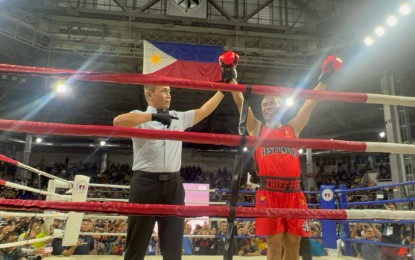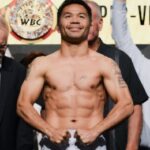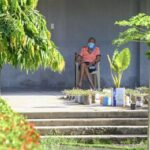MANILA – Philippine National Police (PNP) chief Gen. Nicolas Torre III on Sunday won by default in a charity boxing match against acting Davao City Mayor Sebastian “Baste” Duterte, who did not show up.
The match raised more than PHP20 million in cash donations and ticket sales.
The crowd later joined the ring announcer in the countdown for Baste to appear.
“You’re the winner, General Nicolas Torre III!” the ring announcer declared after the countdown ended.
With the song “Eye of the Tiger” playing in the background, Torre jogged toward the boxing ring set up inside the Rizal Memorial Coliseum in Manila after four undercard fights featuring boxers from the PNP Boxing Team.
Torre said the PNP had already received around PHP16.3 million in cash donations from various sponsors.
He added that two tons of relief goods were also donated to the PNP in support of the charity boxing match, valued at around PHP4.2 million. Ticket sales generated approximately PHP350,000.
“We will donate all proceeds to our fellow citizens affected by the typhoon. In fact, we will be going to Baseco (Manila) later to deliver assistance,” Torre said, noting that donations would be distributed through agencies such as the Department of Social Welfare and Development and the Philippine Red Cross.
Torre’s camp began preparing for the bout after Baste Duterte issued a statement demanding that he would only fight if President Ferdinand R. Marcos Jr. and all elected officials underwent a drug test.
“First of all, it’s just the two of us involved here. A hair follicle test for both of us can be done anytime, anywhere. You can see the effort we’ve put into this, and I don’t think he is worth responding to at this point. Let him stay in his own world for now,” Torre told reporters.
Duterte had initially mentioned a fistfight with Torre in one of his podcasts—a challenge the PNP chief accepted but proposed turning it into a charity boxing match for disaster victims.
When Baste began making what others called “impossible demands,” Torre sensed that the former had no real intention to fight.
Baste later stated he would fight Torre between Tuesday and Friday of that week, but Torre was no longer interested.
“We’ve said everything, so this was the only chance we would entertain him. After that, he’s irrelevant. There were too many conditions. When you issue a challenge, you must stand by it. If you can’t, just stop,” he said.
Torre insisted the event proceed since sponsors had already committed donations.
When Baste attempted to reschedule the fight again, Torre dismissed the idea.
“There’s no logic in anything he says anymore. Fool me once, shame on you; fool me twice, shame on me. I’m not like his supporters, whom he can deceive endlessly,” he said.
Among the attendees were Department of the Interior and Local Government Secretary Jonvic Remulla, National Police Commission Vice Chairman Raphael Calinisan, and senior PNP officials.
Rizal Memorial Coliseum
The **Rizal Memorial Coliseum** is a historic indoor arena in Manila, Philippines, built in 1934 as part of the Rizal Memorial Sports Complex to honor national hero José Rizal. It has hosted numerous significant events, including the 1954 Asian Games, and remains a key venue for sports, concerts, and cultural activities. The coliseum is recognized for its Art Deco design and enduring role in Philippine sports history.
Department of Social Welfare and Development
The **Department of Social Welfare and Development (DSWD)** is the Philippine government agency responsible for social welfare programs, community development, and disaster response. Established in 1915 as the *Public Welfare Board*, it evolved into the DSWD in 1987 to address poverty, child welfare, and marginalized sectors. Today, it implements key initiatives like conditional cash transfers (4Ps) and emergency relief efforts.
Philippine Red Cross
The **Philippine Red Cross (PRC)** is a humanitarian organization established in 1947, following the principles of the International Red Cross and Red Crescent Movement. It provides emergency response, blood donation services, disaster relief, and health programs across the Philippines. Originally founded during the American colonial period as a branch of the American Red Cross, it became an independent national society after the country gained independence.
PNP Boxing Team
The PNP Boxing Team is a renowned boxing squad affiliated with the Philippine National Police (PNP), established to promote discipline, physical fitness, and sportsmanship among officers. With a history rooted in the PNP’s commitment to community engagement and youth development, the team has produced skilled boxers who compete in national and regional tournaments. The program also serves as an outreach initiative to steer young athletes away from crime through sports.
Baseco
Baseco is a large informal settlement located along Manila Bay in Tondo, Manila, Philippines. Originally a shipyard and port area, it became home to thousands of urban poor families, many of whom rely on fishing and informal labor. Despite challenges like poverty and vulnerability to disasters, the community has grown into a resilient neighborhood with grassroots initiatives and government projects aimed at improving living conditions.
Department of the Interior and Local Government
The **Department of the Interior and Local Government (DILG)** is a Philippine government agency responsible for promoting peace, ensuring public order, and overseeing local governance. Established in 1897 during the Spanish colonial period and reorganized multiple times, it now supervises local government units (LGUs) and supports community development. The DILG plays a key role in decentralization efforts and disaster resilience programs nationwide.
National Police Commission
The **National Police Commission (NPC)** is a government body responsible for overseeing and improving the efficiency and accountability of police forces. Established in many countries, such as the Philippines (where it was created in 1966) and Sri Lanka, it often serves as a civilian review board to address complaints, ensure transparency, and recommend reforms in law enforcement. Its history is tied to efforts to enhance police professionalism and public trust in policing systems.
Eye of the Tiger
“Eye of the Tiger” is not a known historical or cultural site, but it is famously associated with the 1982 song of the same name by Survivor, which was the theme for the movie *Rocky III*. The phrase symbolizes determination and resilience, inspired by the underdog spirit of the *Rocky* film series. If referring to a specific location or lesser-known cultural reference, additional context would be needed.






